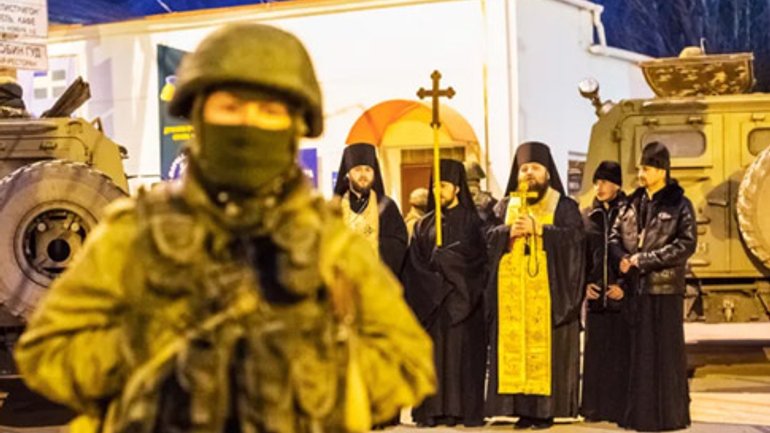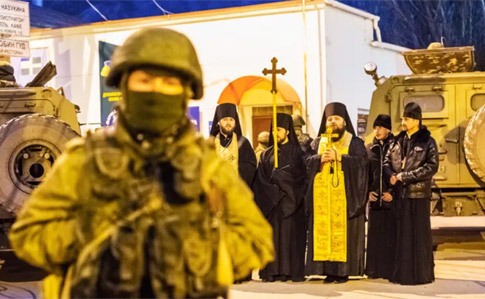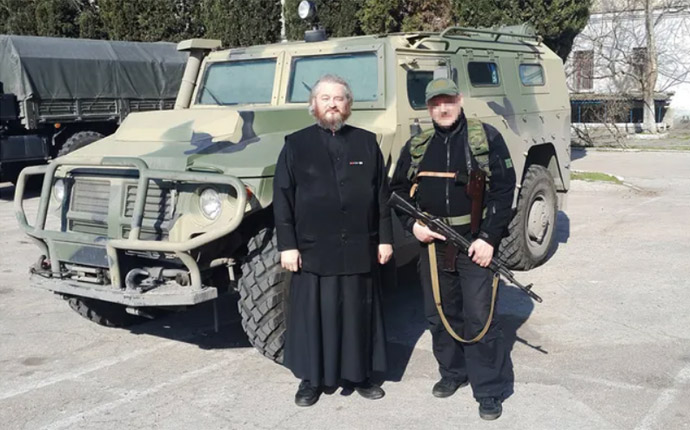ROC clergy proactively helped the “green men” to capture Crimea, - participants of annexation


Russian Orthodox priests took part in the special operation to capture Crimea in 2014 and did so at the invitation of the Russian Defense Ministry.
This is reported by Medusa media with reference to the participants of the annexation, reports Ukrayinska Pravda.
"They called and said: we have a situation in the Crimea, we need you here... It was decided to call Father Dimitri (Vasilenkov, Deputy Chairman of the Department for interaction with the armed forces and law enforcement agencies of the St. Petersburg diocese, - ed.) from St. Petersburg – and we began to tour the Ukrainian military units," said a veteran of the GRU special forces, who took part in negotiations with the Ukrainian military.
He said that Fr Dimitri visited military units surrounded by so-called "Cossacks" who were called from Krasnoyarsk specifically for this operation.
According to the source of the publication, the gates of the parts were opened through the priest. He added that the maximum task was to achieve the peaceful disarmament of the units.
The negotiations were conducted from a position of strength because the Crimean military units were already surrounded by Russian special forces and Pro-Russian paramilitary groups.
According to the source, the Ukrainian military were ready to talk to the priest, because they were in a serious psychological state and did not receive clear orders from Kyiv.
He added that "two machine gunners" who accompanied the "Cossacks" and Fr Dimitri were very helpful.
Father Dimitri admitted that "he was in Crimea on the line of the Defense Ministry", but refused to talk about it, and the success of the special operation explained "by a miracle of God", saying "the Lord did not allow bloodshed".
It is noted that in his diocese, Dimitri Vasilenkov works with the Cossacks and actively helps the security forces: in addition to dozens of business trips to the Caucasus and South Ossetia, the archpriest heads parishes at the Russian National Guard and the Federal Penitentiary Service.
According to Medusa, the archpriest of St. Petersburg could have taken part in the last two weeks of negotiations, which lasted until March 24.
On March 23, 2014, Dimitri published photos on his Vkontakte page with an armed man against the background of an armored car "Tiger" with the caption: "polite people have polite confessors."

According to the source of the publication among the so-called "negotiators" in Crimea, the photo was taken on the territory of a Ukrainian military unit.
Also in the special operation in the Crimea, the Western military district could attract Alexander Nazarov - assistant Abbot of the St. Petersburg Monastery ''Optina Pustin'. He and Vasylenkov worked together in Chechnya: they carried humanitarian aid to the Republic, sprinkled holy water on personnel, blessed military equipment and baptized scouts.
Nazarov, like Vasilenkov, was awarded the order of Friendship in 2015 by the same presidential decree, allegedly "for work in Crimea". According to flight data, they both flew on the same flight from Moscow to Anapa on March 13, 2014.
It is noted that Vasylenkov and Nazarov were not the only representatives of the ROC who came from Russia to take part in the Crimean special operation. According to the sources of the media outlet, there were a lot of people who wanted to, because they promised rewards, which are very highly valued by the clergy.
Medusa was told about the participation of Russian priests in negotiations with military units by an interlocutor among veterans of the armed forces of Ukraine, Archbishop Klyment of Simferopol and Crimea, who manages the Crimean Diocese of the OCU, and a representative of the OCU, Ivan Katkalo.
Crimean priests of the Moscow Patriarchate also participated in negotiations with Ukrainian military units.
The sources named in particular the rector of the Church of the Feodorov icon of the mother of God, Fr Pyotr Tchaikovsky, and the head of the Military Department of the Simferopol and Crimean Diocese, Dimitri Korotkov.
According to Bishop Klyment, Crimean priests of the Moscow Patriarchate in military units conducted "ideological subversive work": they spoke about love and friendship, that the military did not have the right to shoot, because they were Russian brothers and their blood would be on them.
Archbishop Klyment noted that by doing so the priests " openly incited soldiers to treason and demoralized the Ukrainian army with their sermons."
It is also noted that some Crimean churches of the Moscow Patriarchate in the days of the confrontation turned into barracks and even weapons depots for the so-called "Cossack formations" that entered the Crimea from the territory of Russia. These temples were at least 6.









